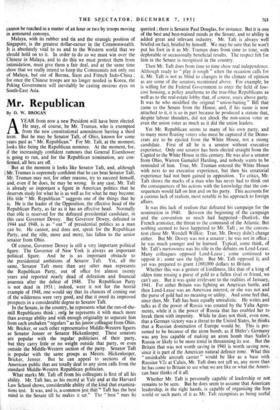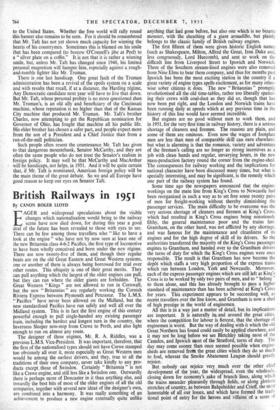Mr. Republican
By D. W. BROGAN
AYEAR from now a new President will have been elected. He may, of course, be Mr. Truman, who is exempted from the new constitutional amendment barring a third term. But he may be Senator Taft, of Ohio, known for some years past as "Mr. Republican." For Mr. Taft, at the moment, looks like being the Republican nominee. At the moment, /for, if the increasingly confident rumours that General Eisenhower is going to run, and for the Republican nomination, are con- firmed, all bets are off.
But at the moment it looks like Senator Taft, and, although i.Mr. Truman is supremely confident that he can beat Senator Taft, Mr. Truman may not, for other reasons, try to succeed himself, and, even if he does, he may be wrong. In any case, Mr. Taft is already so important a figure in American politics that he deserves study for what he is as well as for what he may become.
His title "Mr. Republican" suggests one of the things that he is. He is the leader of the Opposition, the effective head of the Republican Party, as far as it has an effective head. Normally that role is reserved for the defeated presidential candidate, in this case Governor Dewey. But Governor Dewey, defeated in 1944 and 1948, is as " out " of presidential., politics as .a man can be. He cannot, and does not, speak for the Republican Party, and the role, more and more, has fallen to the senior senator from Ohio.
Of course, Governor Dewey is still a very important political figure. The Governor of New York is always an important political figure. And he is an important obstacle to the presidential ambitions of Senator Taft. Yet, all the same, Senator Taft more than any other man represents the Republican Party, out of office for almost twenty years and reported nearly dead of defeatism and financial anaemia after the defeat of 1948. The Republican Party is not dead in 1951 ; indeed, were it not for the horrid example of 1948, one would say that its chances of coming out of the wilderness were very good, and that it owed its improved prospects in a considerable degree to Senator Taft. In the Senate, in the country, he represents what the-run-of-the- mill Republicans think; only he represents it with much more than average ability and with enough originality to separate him from such unshaken "regulars" as his junior cpileague from Ohio. Mr. Bricker, or such other representative Middle-Western figures as Senator Jenner or Senator Hickenloopet, These senators are popular with the regular politicians of their party, but they carry little or no weight outside that party, or even outside the Middle-Western section of the party. Senator Taft is popular with the same groups as Messrs. Hickenlooper, Bricker, Jenner. But he can appeal to sections of the American public that are totally deaf to any siren calls from the standard Middle-Western Republican politician. What marks Mr. Taft off from his colleagues is first of all his ability. Mr. Taft has, as his record at Yale and at the Harvard Law School shows,-considerable ability of the kind that examina- tions test. It was, and is, a-common test thke." Taff has the best mind in the Senate till he makes it up." The " best " may be queried ; there is Senator Paul Douglas, for instance. But it is one of the best and best-trained minds in the Senate. and to ability is added great and relevant industry. Mr. Taft is always well briefed on fact, briefed by himself. We may be sure that he won't put his foot in it as Mr. Truman does from time to time, with deplorable or occasionally beneficial results. The respect felt for him in the Senate is recognised in the country.
Then Mr. Taft does from time to time show real independence. Although ready to "play it rough" when the occasion calls for it, Mr. Taft is not as blind to changes in the climate of opinion as are some of the senators mentioned above. For example, he is willing for the Federal Government to enter the field of low- cost housing, a policy anathema to the true-blue Republicans as well as to the real-estate lobby that, of course, soars above party. It was he who modified the original " union-baiting " Bill that came to the Senate from the House, and, if his name is now attached to it, it is so in part because he produced a statute that, despite labour thunders, did not shock the non-union voter or even the union voter as much as it did the union leaders.
Yet Mr. Republican seems to many of his own party, and to many more floating voters who must be captured if the Demo- crats are to be ejected from the White House, not a strong candidate. First of all he is a senator without executive experience. Only one senator has been elected straight from the Capitol to the White House in this century. He was also a senator from Ohio, Warren Gamaliel Harding, and nobody wants to be reminded of him. True, Mr. Truman entered the White House with next to no executive experience, but then his senatorial experience had not been gained in opposition. To critics, Mr. Taft shows the marks of a man who has never had to think out the consequences of his actions with the knowledge that the con- sequences would fall on him and on his party. This accounts for a curious lack of realism, most notable in his approach to foreign 'affairs.
It was this lack of realism that defeated his campaign for the nomination in 1940. Between the beginning of the campaign and the convention so much had happened—Dunkirk, the French armistice, the threat to the command of the Atlantic. But nothing seemed to have happened to Mr. Taft ; so the conven- tion chose Mr. Wendell Willkie. True, Mr. Dewey didn't change either. But Mr. Dewey was not a senator ; he was not in office ; he was much younger and he learned. Typical, some think, of Mr. Taft's narrowness was his rale in the debates on Lend-Lease. Many colleagues opposed Lend-Lease ; some continued to oppos'e it ; some saw the light. But Mr. Taft opposed it, and yet was prepared to grant 1,000,000 dollars to Britain. Whether this was a gesture of kindliness, like that of a king-of olden time tossing a purse of gold to a fallen rival or friend, we can't say. But it was quite irrelevant to the realities of January, 1941. For either Britain was fighting an American battle, and then Lend-Lease was an American interest, or she was not and the purse of gold had no meaning or utility. And some feel that, since then, Mr. Taft has been equally unrealistic. He writes and talks as if the power of Russia was created by the Yalta Agree- ments, while it is the power of Russia that has enabled her to break them with impunity. While-he does not think, even now, that a German victory was a threat to the United States, he thinks that a Russian domination of Europe would be. This is pre- sumed to be because of the atom bomb, as if Hitler's Germany was any less capable of making an atom bomb than Stalin's Russia or likely to be more timid in threatening its use. But the Britain that was not worth saving in 1941 is worth saving now, since it is part of the American natural defence zone. What this "unsinkable aircraft carrier" would be like as a base with Russian V2s at Calais, Mr. Taft does not tell us, any more than he has come to Britain to see what we are like or what the Ameri- can base thinks of it all.
Whether Mr. Taft is personally capable of leadership or not remains to be seen. But he does seem to assume that American leadership, in the right hands, is capable of organising the free world or such parts of it as Mr. Taft recognises as being useful to the United States. Whether the free world will rally round this banner also remains to be seen. For it should be remembered that Mr. Taft has not yet shown much capacity for winning the hearts of his countrymen. Sometimes this is blamed on his smile that has been compared (to borrow O'Connell's jibe at Peel) to a "silver plate on a coffin." It is not that it is rather a winning smile, but, unless Mr. Taft has changed since 1948, his limited personal magnetism will hamper him, especially against a rough- and-tumble fighter like Mr. Truman.
There is one last handicap. One great fault of the Truman administration has been a revival of the spoils system on a scale and with results that recall, if at a distance, the Harding regime, Any Democratic candidate next year will have to live that down. But Mr. Taft, whose personal probity is no more questioned than Mr. Truman's, is an old ally and beneficiary of the Cincinnati machine, -whose reputation is no higher than that of the Kansas City machine that produced Mr. Truman. Mr. Taft's brother Charles, now attempting to get the Republican nomination for Governor of Ohio, has fought that machine all his public life. His elder brother has chosen a safer part, and people expect more from the son of a President and a Chief Justice than from a run-of-the-mill politician.
Such people often resent the countenance Mr. Taft has given to that dangerous mountebank, Senator McCarthy, and they are often the same people who do not trust the Senator's realism in foreign policy. It may well be that McCarthy and MacArthur will be handicaps, not helps, in 1951. And it will be quite certain that, if Mr. Taft is nominated, American foreign policy will be the main theme of the great debate. So we and all Europe have good reason to keep our eyes on Senator Taft.



















































 Previous page
Previous page